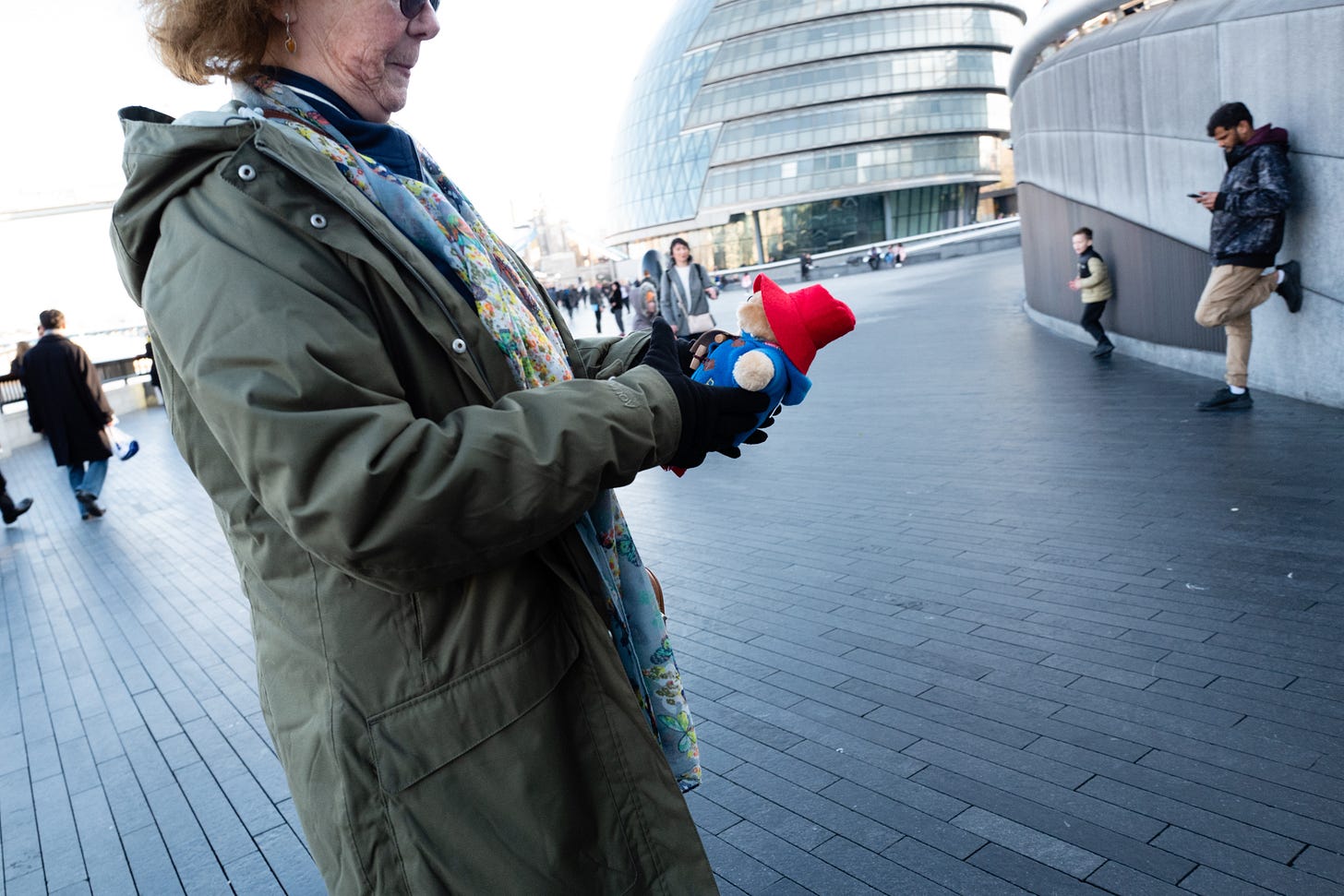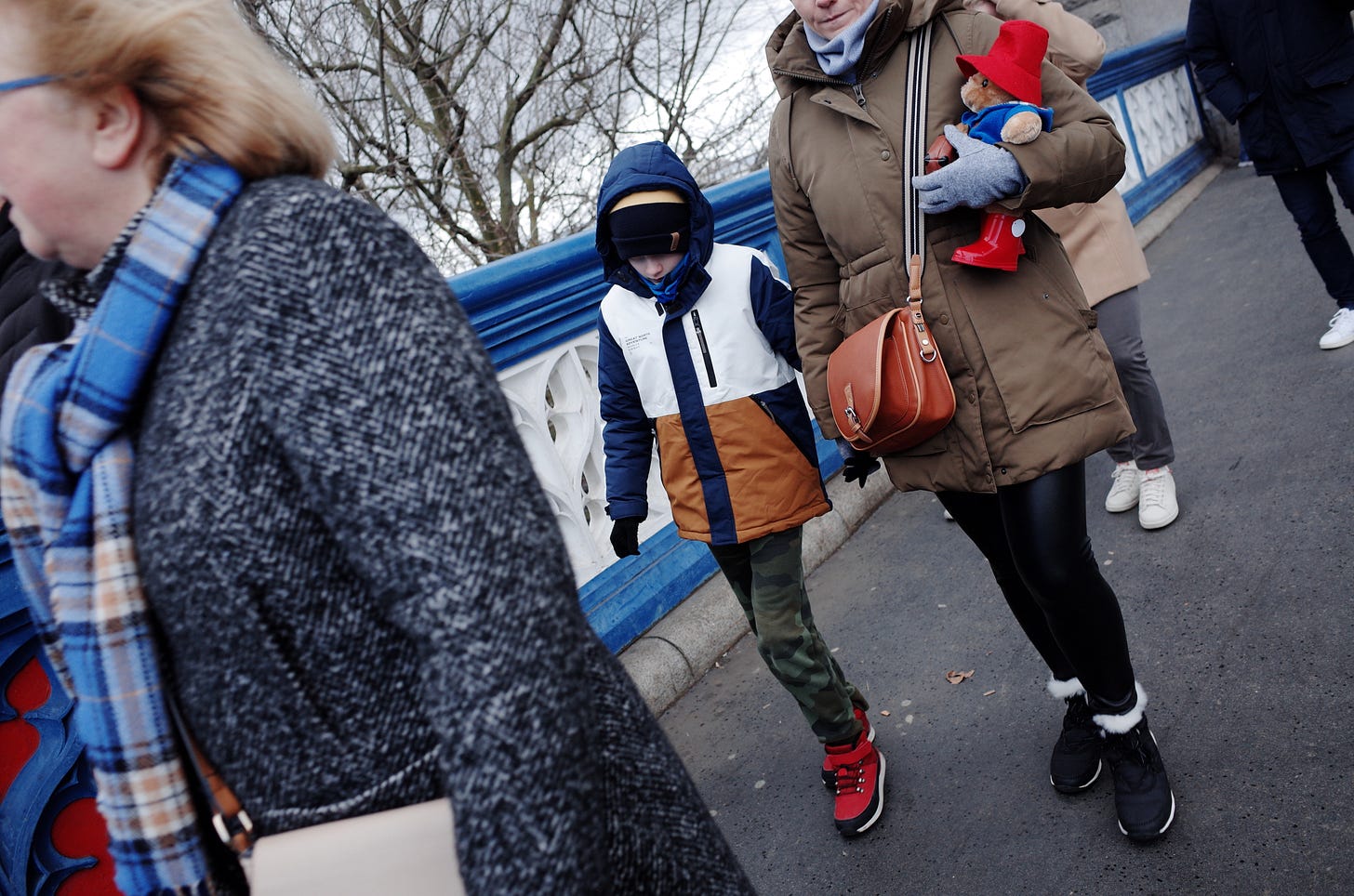Paddington Bear
Migration and Assimilation
Today, Paddington Bear figures, alongside Harry Potter, as a quintessentially British metonym. It’s not surprising, then, that I have seen a lot of him around. Just as tourists two decades ago would identify themselves by walking around the streets of New York with a green, foam headband that resembled the spiky crown of the Statue of Liberty, now tourists here in London strut across Tower Bridge (below) or stroll across The Queens Walk on south bank of the Thames (above) with a stuffed version of Paddington Bear.
Before reading up on him, all I knew about Paddington Bear was that he was the subject of a series of beloved children’s books and, later, films. Oh, and I figured there was some kind of connection to Paddington Station. But it seems that Paddington Bear is today, given the current discussions around immigration policy in the UK, more important ever.
The creator of Paddington Bear is Michael Bond, a former BBC cameraman, who conceived of a story involving a small bear from South America, stranded in London, specifically Paddington Station, in the 1950s. In “A Bear Called Paddington,” published in 1958, an English family, the Browns, discovers a lonely bear with a suitcase and a sign around his neck that said, “Please Look After This Bear.” The choice of Paddington Station is deliberate as it was where trains to and from Wales and western England would be stationed. As Bond would explain in many interviews, the inspiration for the character came from his memories of the run up to World War II, during which Jewish refugees, and in particular children, were brought from Europe and then sent onwards to the countryside in what is known as Kindertransport, a program which evacuated over 10,000 children from Germany, Austria, Czechoslovakia, Poland among other places. “Paddington, in a sense, was a refugee, and I do think that there’s no sadder sight than refugees,” he is quoted as saying.
If there is an American equivalent, in my mind, it is Fievel Mousekewitz of An American Tail, an animated feature about a family of Russian Jewish immigrant mice, who flee antisemitic Russia to New York City, mirroring the migration patterns of Russian Jews escaping the pogroms in the late-19th century. During the journey to Ellis Island, Fievel is separated from the rest of his family. The movie details the struggles of arriving in a new country and a new city and figuring out how to survive and persevere.
But “A Bear Called Paddington” was not simply about World War II. It was also a commentary on its present. Its publication was contemporaneous with a massive influx of migrants from all over the former colonies of the British Empire. In what is called the Windrush generation, people from the Caribbean, Africa and the Indian subcontinent moved to the UK to help fill post-war labor shortages. Notting Hill, which is often mentioned in the Paddington Bear books, is the home of Carnival due its historical links with Afro-Caribbean culture in London. It’s more Eastern Parkway (for my New Yorkers) than Hugh Grant and Julia Roberts. It is also where racist attacks occurred in the very year of Paddington Bear’s publication. We can see photographic evidence of this period in Black Britain edited by the pre-eminent British sociologist Paul Gilroy. There, Gilroy notes:
As they [immigrant communities] moved into Britain’s metropolitan centres seeking safe, warm houses and secure employment, the incomers encountered more than the habitual humiliation of the Colour Bar. They [were] met with vicious and brutal intimidation organised by a political movement oriented by the impossible and absurd imperative to ‘Keep Britain White’ (KBW)…that frightening slogan was painted on the walls of the bomb-damaged, inner-city neighbourhoods where black communities were being established against the odds…the graffiti’s intimidatory imperative is understood better as a warning to the new settlers. It told them that they were at risk from the violence of a resentful minority who would not be reconciled to their presence.
Those immigrant stories only somewhat parallel Paddington’s story. While they are both stories of “assimilation,” broadly defined, Gilroy’s account is decidedly also one of ethnonationalist backlash. In the case of Paddington, his friendship with Mr Gruber, a Hungarian shop owner, is where we can see the novelty and weirdness of British ways, which are illustrated rather innocuously. For instance, they bond over things like going to the theater and being asked whether you’d like a program (“programme”), by which the usher actually means to ask whether you’d like to purchase one. Why don’t they simply make it clear that they are selling it? Paddington Bear, therefore, in both book and cinematic form, as one writer puts it, “captures [a] cramped Englishness.”
If only the current discussions around the UK’s immigration policy were about matters of such low stakes. But just recently, former UK footballer and current BBC broadcaster, Gary Lineker was suspended for criticizing the current Tory government’s proposed policy to “Stop the Boats,” that is, stop people from claiming asylum in the UK if they arrive in an unauthorized way, what the bill calls “irregular means,” such as in small boats or hidden in the backs of trucks. If found to have arrived in such a way, which many people fleeing their countries of origin would be, then the Home Office has the right to detain you for 28 days without access to a lawyer or bail. This exceeds the detainment period for terrorism suspects, which is 14 days. Additionally, the Home Office will be able to send people to Rwanda each year. Some organizations such as the Refugee Council estimate that this could mean that nearly 200,000 people, including 40,000 children, could be affected. On Twitter, Lineker likened the bill to “Germany in the 30s,” calling the policy “cruel.” Afterwards, after Suella Braverman, the Home Secretary, who has championed the proposed legislation, took offence, suggesting that Lineker had diminished the experience of the Holocaust. Although it is unclear whether it did so in consequence, the BBC suspended Lineker although the UN’s refugee agency had denounced the plan as effectively an “asylum ban.”
Lineker was reinstated, after public outcry as well as an expression of solidarity by his colleagues, who didn’t take the air. Given this, it’s rather rich to see so many Paddington Bear dolls across the city. I wonder whether Paddington would be seen as so friendly had his story moreso resembled Fievel’s, which one writer characterizes as “the inevitable disillusionment that comes from holding up the United States as the promised land.” In the course of An American Tail, Fievel realizes that:
In some ways [America is] as hostile as the [country] he left behind, compounded by the trauma of immigration itself, but in others, it’s a place where he can dream, grow and better himself and his community.
Perhaps a dose of this would help us see Paddington Bear as more than a cute toy, and also as a symbol of the promise that the UK has yet to fulfill.
References
BBC News. “Windrush Generation: Who Are They and Why Are They Facing Problems?,” April 16, 2018, sec. UK. https://www.bbc.com/news/uk-43782241.
Bluth, Don. “An American Tail Was My Own Test of Endurance.” Vulture (blog), July 5, 2022. https://www.vulture.com/article/don-bluth-steven-spielberg-an-american-tail.html.
Gilroy, Paul, and Stuart Hall. Black Britain: A Photographic History. First Edition Soft Back. London: Saqi Books, 2011.
Landler, Mark. “Spiraling Dispute With Star Host Puts BBC’s Reputation on the Line.” The New York Times, March 12, 2023, sec. World. https://www.nytimes.com/2023/03/12/world/europe/gary-lineker-bbc.html.
Long, Rebecca. “‘An American Tail’ Explores Bleak Immigrant Struggles That Still Resonate in 2019.” Vice (blog), November 21, 2019. https://www.vice.com/en/article/9kep95/an-american-tail-explores-bleak-immigrant-struggles-that-still-resonate-in-2019.
Mead, Rebecca. “Paddington Bear, Refugee.” The New Yorker, June 28, 2017. https://www.newyorker.com/culture/cultural-comment/paddington-bear-refugee.
Media, P. A. “Channel Crossings Scheme Costs ‘Could Top £9bn in Three Years.’” The Guardian, March 22, 2023, sec. UK news. https://www.theguardian.com/uk-news/2023/mar/22/channel-crossings-scheme-costs-could-top-9bn-in-three-years.
Rose, Steve. “Paddington, Go Home: Should Our Fantasy Stories Be More Truthful?” The Guardian, October 30, 2017, sec. Film. https://www.theguardian.com/film/2017/oct/30/paddington-go-home-should-fantasy-stories-be-more-truthful.
Taylor, Diane. “‘Draconian’ Migration Bill Could Leave Tens of Thousands Destitute or Locked Up.” The Guardian, March 22, 2023, sec. World news. https://www.theguardian.com/world/2023/mar/22/draconian-migration-bill-could-leave-tens-of-thousands-destitute-or-locked-up.
Weil, Abigail. “Revisiting ‘An American Tail,’ a Deeply Jewish Immigration Story.” Hey Alma, September 20, 2021. https://www.heyalma.com/revisiting-an-american-tail-a-deeply-jewish-immigration-story/.

